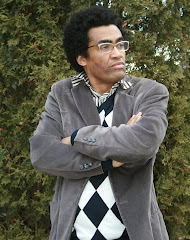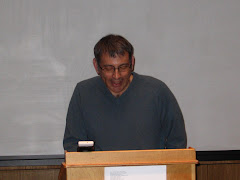This blog is dedicated to the New Writing Series and creative talents which grace the readings during each presentation. I aim to write my thoughts and interpretations of the New Writing Series readings, enjoy!
Monday, April 7, 2008
Some Answers...
I first heard about at the New Writing Series. I think I’ve said that before. According to wikepedia poet Gary Sullivan had made up the term in late 2000 when he submitted deliberately bad poems to a poetry contest to Poetry.com, to test its supposed standards for excellence. (wikepedia)
Old School Flarf is also marked by a certain distinctive tonal dialect. In Rodney Koeneke’s first reading, he initially droned out words like they were being played over a video in slow motion. This was the first time I saw a poet draw out words like that, and I think the audience was just as baffled as I was.
Poets do indeed use the Google and other search engines for ideas for their poems, but there are no limitations I guess as poets pose their own ideas for flarf nonsense.
Most flarf poems are also intentionally offensive and sound like gibberish or nonsense but to me I think it’s interesting. I’m not sure how to find these search phrases though, I need to do some more research first.
More Questions about Flarf
I guess I want to find some phrases I could write about. Where do I find them!
Last Two Events of the New Writing Series for Spring 08
Next week on April 10 the Soderberg Auditorium in Jenness Hall former fiction writer Julia Elliot is set to read according to the UMaine New Writings Series blog at http://nwsnews.wordpress.com/.
Elliot is an instructor of English and Woman studies at University of South Carolina, and this will be her first time reading at the New Writing Series.
The last reading for the NWS Spring Semester of 2008 will take place on April 29th in the Hill Auditorium where Patricia Sithole and Otrude Mayo are set to read.
Sunday, April 6, 2008
What makes Flarf Poetry?
Flarf poetry can be characterized as a contemporary innovative poetry movement, which attempts to explore ironically inappropriate language, that is the definition I pieced together from Wikepedia.
The Flarf language spans from bizarre word arrangements of returned search phrases run through Google to made up ones from the poets who write them. Flarf is also described by poet Mel Nichols as “dismissed language,” which is discomforting and humorous.
Flarf poems by Smith included, "Cheney puppy killer," and "Osama been drinking," and Nichols also contributed innovative flarf poems with "James Joyce Gone Wild," "Pope my Ride," and "Ben Franklin's Man-Boobs."
Obviously these poets are using the Flarf language to comment on popular culture, but I wanted to go more simple to start out my own flarf writing.
During the last reading, I was thinking about some obscure searches I could possibly write a poem on. The phrase drunken battleships popped into my mind. I was inspired by Koeneke's "Pizza Kitty," it was a comical sarcastic story of a cat ordering pizza, so I thought about a phrase that was just ridiculous, so the phrase drunken battleships popped in my mind. What am I supposed to do with this phrase?
So I decided to search the phrase on Google. I found that drunken battleships is actually a binge drinking game. How the game works is, when your battleship gets hit, while playing that Sink My Battleship game, you drink your preferable intake of alcohol. I think this could be an interesting flarf poem, but I don't know how to get started. If anyone is interested perhaps let me know if I'm on the right track, and if I could work out a flarf poem out of this. I'll brainstorm some ideas and post it in a weeks time, I hope I don't embarrass myself.
I think Flarf can take on into acting and even improv. I read the language is already influencing plays and other texts. Imagine flarf monologues at Broadway? I can only dream.
Saturday, April 5, 2008
GET YOUR FLARF ON!
In one of the more humorous readings at the New Writing Series poets Rodney Koeneke & Benjamin Friedlander read Flarf poetry and other works.
I’m a new comer to Flarf poetry; you can even say I’m a newcomer to poetry as well, but in my second experience with flarf at the NWS on Thursday, I don’t think poetry or flarf will be the same for me again.
In my understanding of Flarf poetry, I guess it’s a sarcastic, abstract punning of words from ridiculous Google searches. I’ll talk more about flarf poetry later, but I wanted to write a recap of one of the most comical NWS I’ve ever been to.
Mr. Friedlander read first and was introduced as a colleague, editor, and poet by curator of the NWS Steve Evans.
I took Reading Poems last semester with Mr. Friedlander. It was a great class because of the communal, laid-back atmosphere of the classroom. Mr. Friedlander was also very insightful in his relaxed approach to the poetry, as he always encouraged questions and thought from everyone. It was honesty my favorite class I’ve taken so far at the University.
Anyway, Mr. Friedlander read translations of German and Italian poems and then went into his own Flarf work. I have to say that hearing these translations was very refreshing; especially the piece entitled “To Set Your Mind at Rest.” He said that the work was his own personal versification as well I believe. Versifying poems in the Reading Poems class was not easy, props to main man, I guess he's a little more experienced then I am however.
A great deal of Mr. Friedlander’s flarf poetry is not only comical and even satirical but it seems to have its resonance with its subtly witty phrases. Especially the poem, “This is my statement on poetics: Hillary Duff.”
Mr. Friedlander’s work also seemed like continuing conversation, a stream of flarf consciousness if you will. His poems ranged in tone and pace as well.
Rodney Keneke was very animated and comical in his performance. He interacted with the audience throughout the night as he finished the readings from a particular collection and handed them off to someone in the crowd. His tempo and tone kind of reminded me of an intelligent Will Ferrell.
To be honest, I found Keneke’s presentation of “pizza kitty,” to be one of the funniest things I’ve ever seen. It’s a running together of obscure searches that circle around a kitty ordering pizza I guess. It’s interesting to pick out what phrases are the ones taken from the Google searches and what ones the poet is making up because of the search phrases. I mean come on, the title says it all. Here are some of the poem’s stanza’s I got from http://mainstreampoetry.blogspot.com/2003/02/pizza-kitty.html.
Pizza Kitty
By Rodney Keneke
Kitty Goes Postal--
wants pizza.
Kitty has hat & cape and looks
like a magician . . .
Observe kitty eating a slice of pizza.
"Eat some free pizza, Kitty!" YUM
(pizza man impatient at the door)
BAD KITTY LIST, FOOD RELATED
_____will not use my ninja kitty paw strike
_____naked on sofa with rapidly-cooling pizza
_____monster clowns with KITTY-FACES/
Just had the stupidest idea--
Make KITTY order pizza!
The kitty brings the pizza on its
paw, possibly
cold pizza
Send kind and healing thoughts
to Pizza Kitty
one sick kitty
cute blonde baffled pizza delivery . . .
Obverse of Kitty:
word is they're living off
an "all pizza diet"
Kitty won't be so finicky
When she's served this new stuffed pizza!
Keneke also got into a white shit and pants to dub lines for a music video, Bollywood Movie straight from
Wednesday, April 2, 2008
Kyle's Thoughts on the New Writing Series
The New Writing Series has contributed immensely to my understanding of present day poetry. Flarf poetry which was performed by poet Rod Smith and Mel Nichols on Valentine’s Day at the NWS are examples of innovative new poetic forms which are moving poetry into new possibilities of expression all together.
Hearing contrasting emotions and stories throughout the powerful, succinct stories of poetry all resonant deep meanings or quirky observations, render descriptive and personal experiences, but also bring together insightful words that lift one’s spirit.
One of my most memorable nights at the NWS was the Grady Award Presentation.
Grady Awards brought student writers who read from their works for the undergraduate and graduate winners alike. This particular presentation however marked one of the first nights where short stories were read to the audience.
The story “
Anyway this blog is dedicated to my experiences and observations at the New Writing Series, enjoy!
Tuesday, April 1, 2008
Thomas Sayers Ellis reading
In his first appearance at the New Writing Series, Thomas Sayers Ellis displayed a range for talent and expression last Wednesday at Barrows Hall in a presentation apart of the New Writing Series on March 26th.
Before his next poem, Ellis explained how he spent a summer at Yaddo, an artist’s community located in
The performances of Mr. Ellis heighten his poetry as he “makes the word move on the page,” he adds. Ellis believes also that he can’t read the same poem twice in the same way, and that he’s not accepting of linearity, he say’s that stanza’s are in little boxes and are trapped in books. Ellis thus uses performance, musicality and expression of unique intonations to explore the possibilities of his writing. “Performance is something that encourages the ideas of your poetry; how do you construct the intonation to the writing aspect of it.” Ellis said.
Before introducing his next poem about James Brown, a student started to walk out the door, he shouted to him that he should stay and he asked him to sit down, as the student had a confused smile on his face, Ellis told him he could go and that no one should leave during a James Brown poem, then he said, “oh no sorry it’s a Kurt Coban poem!” Ellis poked fun with the audience throughout the night.
Ellis explained to the audience before his last poem that his Father worshiped James brown, and that the first schooling he ever undertook was the


